#lauras mercantile
Text
Within this broader condemnation of [Alice Perrers'] behaviour, a number of specific themes can be identified. These include sexual immorality, political influence, and [...] numerous and repeated references to greed and avarice. This is particularly striking in two literary representations which may have been inspired by Alice: Chaucer’s Wife of Bath and, most compelling, William Langland’s Lady Meed in his allegorical poem Piers Plowman, a character whose name has become a byword for venality. Meed, like Alice, established her presence at the royal court and acted as a counsellor to the king, but was eventually banished on accusations of being a whore and undermining the workings of law and justice. In particular, in introducing Meed to his audience, Langland describes her hands as covered with rings of the “purest perreize,” a word meaning precious stones or jewels, which would seem to be a play on Alice’s surname, Perrers, and thus directly identifying her with Meed. Chaucer also notably named the wife in the Wife of Bath Alisoun, raising the possibility that she was in part based on his direct contemporary Alice Perrers. The Wife had a husband named Jankyn, similar to the name of Alice’s first husband, Janyn, and was a businesswoman with a mercantile and urban background, echoing Alice’s own early life in London. The Wife was notoriously prolific in her lustful desires, but invariably they had a financial motivation, fusing, in the words of Paul Strohm, “the categories of economic and sexual assertiveness into a single epitome of contemporary male dread.”
-Laura Tompkins, '"Edward III's Gold-Digging Mistress": Alice Perrers, Gender, and Financial Power at the English Royal Court, 1360-1377", "Women and Economic Power in Premodern Courts" (edited by Cathleen Sarti)
#historicwomendaily#alice perrers#english history#edward iii#my post#geoffrey chaucer#to be clear 'being inspired by' doesn't mean 'being a direct analogue of'#so we obviously shouldn't (and Tompkins doesn't) look at it through that angle#also just to clarify - Langland's 'Lady Meed' is a little more complicated.#as per our current understanding of the chronology of his writing:#his 'A text' of Piers Plowman was most likely written in the late 1460s - almost a decade before the parliamentary proceedings against Alic#and thus cannot have been based purely on her but on a wider 'discourse of defamation focused on “problem” women' as Ormrod puts it#HOWEVER we know that Langland redrafted and massively edited the B and C texts from the book much later#and as Matthew Giancarlo and Gwilym Dodd have pointed out there are clear indications he was specifically influenced by Alice's#encounters with Parliament in the 1470s when it came to these texts#also forever loling at Chaucer naming The Wife 'Alisoun' and giving her a husband named Jankyn lmfao#that's hilariously on the nose#but also if they truly were inspired by Alice that's such an epic slay on her part#icon
14 notes
·
View notes
Link
Check out this listing I just added to my Poshmark closet: Little House on the Prairie- Tv Show Book Charm Locket 50Th Anniversary Necklace.
0 notes
Text
Melissa Gilbert had a ready answer when asked why fans of Little House on the Prairie always seem to burst into tears whenever they see her in person.
“Because I do! I think it’s just, you know … the show evokes so much emotion in people and made everybody feel,” Gilbert told the crowd Friday at the three-day Little House on the Prairie Cast Reunion and Festival in Simi Valley, CA. “So when they see us, they have the feels, and then the leftover feels from 50 years ago. Now they’re feeling it again through children and grandchildren. There’s this continuity and sense of family. This is a giant family reunion.”
Thousands of people converged upon Simi Valley’s Rancho Santa Susana Park to remember Little House on the Prairie, the Michael Landon starrer that debuted 50 years ago this year. With the promise to see stars like Gilbert, who played Laura “Half Pint” Ingalls, as well as Alison Arngrim (Nellie Oleson), Karen Grassle (Caroline Ingalls), Bonnie Bartlett (Grace Edwards), Dean Butler (Almanzo Wilder) and Linwood Boomer (Adam Kendall), fans waited in long lines to collect autographs, screen old episodes, and take pictures of re-creations of the iconic sets.
Organizers also assembled a mini-exhibit of Little House artifacts, like copies of old scripts, set stills, Little House inspired lunch boxes, and a ’70s Panavision camera that’s similar to the type used by show. There’s even a shirtless photo of Landon setting up a shot.
The most impressive display was not the re-creation of Oleson’s Mercantile or Half Pint’s homestead, however (though plenty of people took turns taking pictures in them). It was Landon’s golf cart that was made to look like a Surrey — a Christmas gift from cast and crew in 1976.
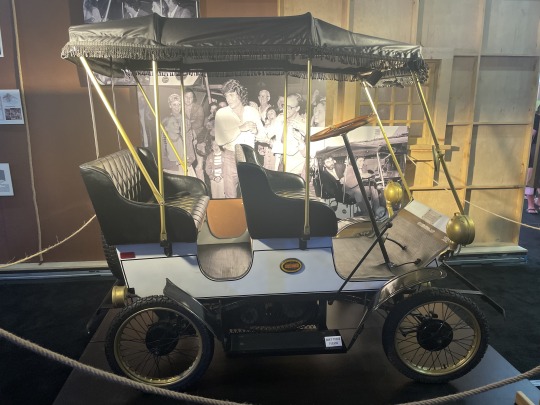
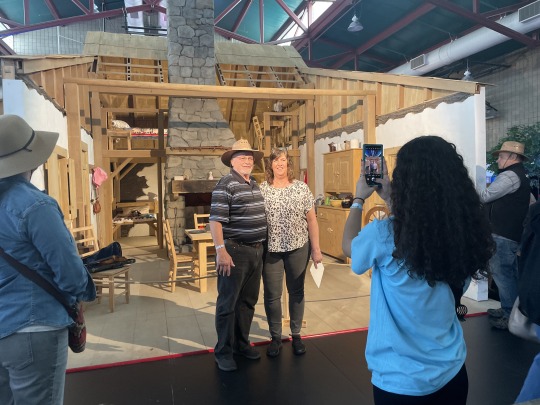
The festival also features lots of panels with the original stars, as well a tributes to Landon (who died in 1991) as well as other Little House stars who have passed. And good news for the attendees who decide to fork over $45 for one-day admission: Besides the one she did Friday, Gilbert also has a panel planned on Sunday, as does Arngrim and Grassle.
There’s even a panel featuring Rachel Linda Greenbush and Sidney Greenbush, the twins who took turns playing Half-Pint’s little sister Carrie. In fact, the crowd on Friday was particularly giddy about the possibility of seeing actors who played wee tots in the original series.
“My brother is here!” exclaimed Gilbert about her younger sibling Jonathan, who played Nellie’s brother Willie on the show. The crowd promptly cheered. “We were just doing a group photo with the entire cast and he walked in. He made the biggest entrance of any cast member. Of course, everybody screamed. I burst into tears. Alison was inconsolable.”
0 notes
Text
Por cierto..RUIZ MATEOS culpo al OPUS DEI de la extraña EXPROPIACION de RUMASA [un conglomerado mercantil que incluia BANCOS o GRANDES ALMACENES q vendieron a precio de FULANA BARATA a un multimillonario VENEZOLANO q luego lo vendió a precio de FULANA DE LUJO a EL CORTE INGLES para quedarse sus edificios como el de CALLAO donde le dije GRACIAS por LIMPIO a LAURA PAUSINI q acaba de grabar con KYLIE MINOGUE enseñando tras cantar JAMAS ANANDONE el PUBIS meses despues en LIMA=CALLAO..donde empeze 2023 tras ver a VERONICA ROMERO q debuto con cd LA FUERZA DEL SOL y cd LLUVIA en SALA MOROCCO tras lo cual fui andando buscando una chocolateria abierta hasta calle virgen de la paz con virgen de la alegría donde está restaurant CHINO PALACIO IMPERIAL donde celebre mi 45 cumple accidentandose el CHAPEOCENSE en el AVION LA MIA y a donde llegue desde la calle MADRE DE DIOS andando para tras cenar pasar x la IGLESIA de NUESTRA SEÑORA DE AME_RICA con pintada SOLO QUIERO TU DINERO [XQ POLLAS TENGO LAS Q QUIERO jaja]
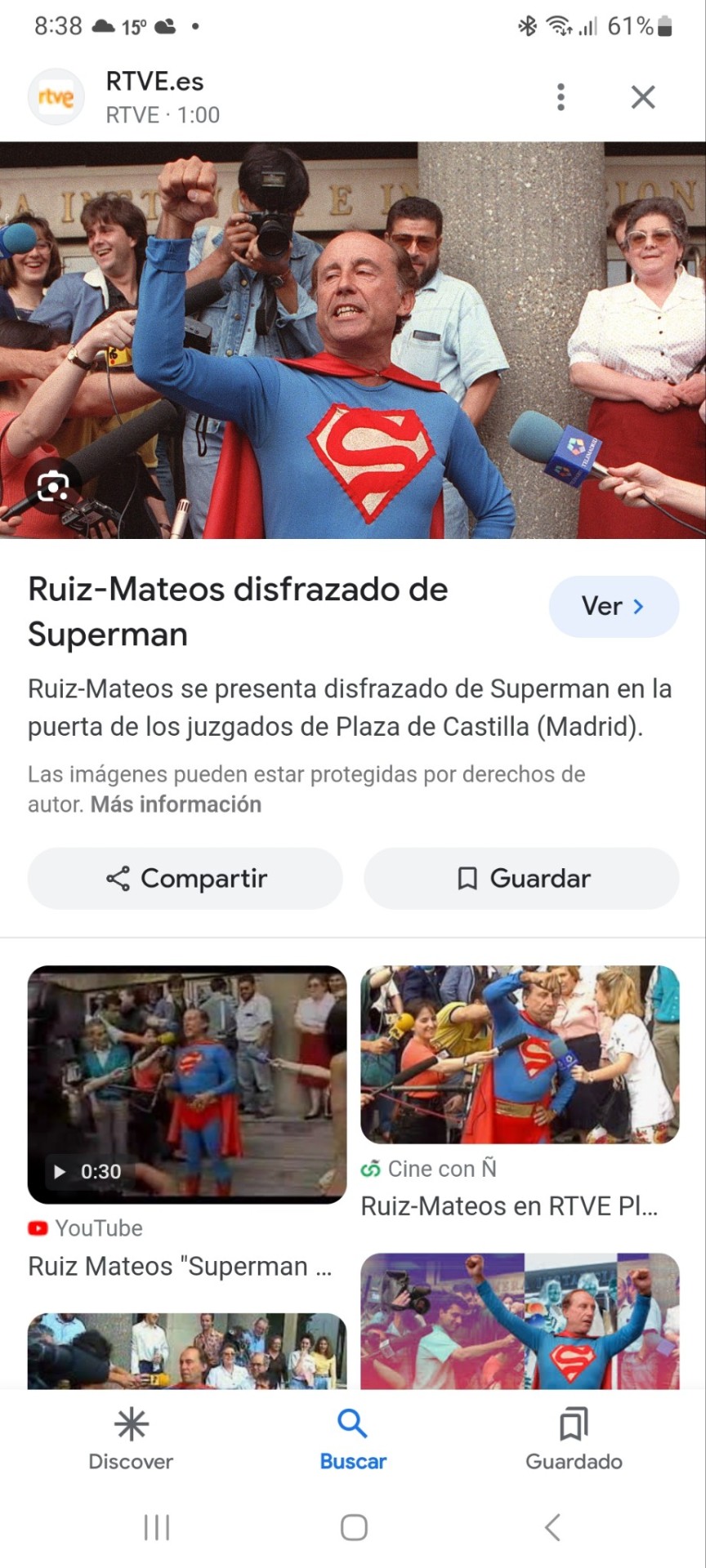
0 notes
Link
0 notes
Photo
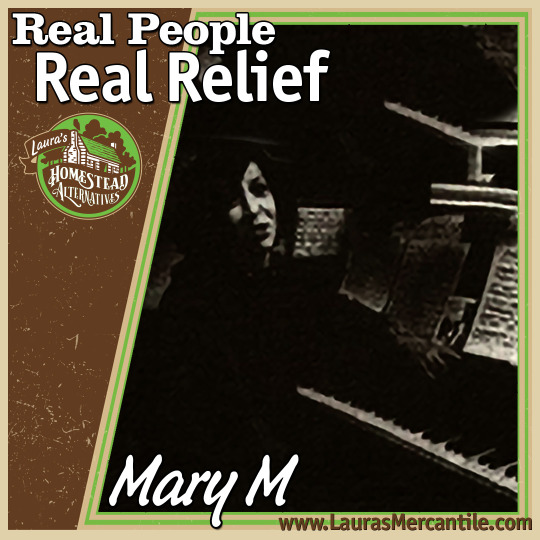
Aspiring songstress Mary Moneypenny says she is getting back to playing her piano “With a little help from my friend”!
#cbd#real people real relief#hemp#organic#cbd oil#cbd hemp#hemp life#lauras mercantile#homestead alternatives#cbd community
2 notes
·
View notes
Text

Who remembers Nancy Oleson?
Played by Allison Balson.
#littlehouseontheprairie#little house on the prairie#lhotp#nancyoleson#theolesonfamily#mercantile#walnutgrove#minnesota#walnut grove#nancy oleson#the olesons#mean girl#1800s#1970s#1980s#pioneers#settlers#homesteading#laura ingalls wilder
1 note
·
View note
Note
I know nothing about Canadian history, except MMIWG, although that isn't really history I guess... Would you share a tiny bit?
Canadian history is fun and complicated and as someone with a teaching degree it is layered af and the way our different provinces operate further complicates these things. We have much to improve on but there are many advancements and developments already done and being done.
That being said, Canadian history has it's share of proud and shameful moments which should be discussed more broadly because hey we're actually a pretty significant ally to some serious world powers in history.
See below the cut for my ranting.
The precursor should be stated that I haven't taught Canadian history in a few years and it's always best to find references for my hearsay lmao.
First a lot of Canadian history will start with Contact (columbus and all that) however in Canada its most Cousteau and Cabot. That being said, Canada has a vast history prior to contact including Viking settlements and of course indigenous history which we continue to uncover to this day as a way of understanding the present state of our indigenous communities and reconcilation.
Canada was mostly colonised by the French and British. These two cultures are constantly at each other. They struggled over the territory until the French lost Quebec in the Seven Years War in 1775. French Canadians were given what’s considered a lenient truce for the time as they were allowed to maintain their language and culture, however this not solve the issue of tensions and assimilation inherent to Canadian culture. French Canadians exist outside of Quebec to this day.
Fur trade was the main business for a long time in Canada (I have a book on my wishlist because I wanna fucks with this harder even though it is hugely taught in basic Canadian history). The North West Company and Huron Bay Company were the two significant traders in the company and a version of the latter now exists as a department story in Canada as the Bay. These two company’s lost much of their power when Britain made Canada a commonwealth and took control of the provinces and territories gradually.
Canada’s economy has always been significantly tied to other countries. Firstly, mercantilism was the way too go, with north american colonies selling raw goods to european powers and buying them back as actual goods, ie. furniture. Canada became a significant trade partner with Britain and later the US, moccassins were a top seller across the border in the 19th century.
Tecumseh is well known in both US and Canadian history but is a major symbol of indigenous history over here to his influence on trying to maintain indigenous independence on both sides of the border and his involvement in the War of 1812.
The War of 1812 is called a victory by whichever side is talking. The US will claim they won and Canada will say the same because we burned the White House, but also, on the border, the Brits marched a small unit of soldiers in circles and convinced the Americans they had like thousands of soldiers lmao.
Laura Secord warned the British of an American attack in this war and now there’s a chocolate boutique named after her. Yay?
Canada had a rebellion in 1837 led by Mackenzie King but it was comparatively lowkey compared to other countries and unsuccessful. The most dramatic event is arguably the burning of newspaper office (may be mistaken) but I recall they wanted to preserve the printing presses for their own uses.
The act of Canada becoming a country happened July 1, 1867 and was called Confederation and so Canada day falls on July 1 every year. It was the union of four provinces; BC, Nova Scotia, Ontario, and Quebec. Canada gained more provinces and territories and gradually gained more internal power into the twentieth century.
Indigenous, or First Nations, Metis, and Inuit communities in Canada fall under the outdated “Indian Act” which maintains their “status” and rights and is the pillar to this day only because it is necessary to continue to address these issues. It remains problematic and is continually amended.
Canada looked to increase immigration towards the end of the 19th century, they instated highly discriminatory laws which tended to deter or exclude “eastern” and non-anglo peoples. The continual journey law said that anyone sailing from India or Asia had to travel in a single trip without stops to enter the country which was near impossible at the time. This led to the Kamagata Maru incident which left a boat full of people stranded on a boat off the Canadian coast.
WWI saw Canada define itself as a wing of the British Army (along with Australians). Canadian soldiers wore maple leaves to demarcate themselves and this is one of the reasons it’s now on our flag. We are cited as having significant effect in battle such as Vimy Ridge and Passchendaele, along with major battles like Ypres.
First Nations soldiers were involved in both wars at a significant percentage, the highest enrollment rate of any population in Canada. In WWI they were often used as snipers because of their hunting practices and experience with rifles. This... well, we’ll come back to this issue as many were not and still are not recognised.
Tommy Douglas founded universal healthcare and has since been voted the Greatest Canadian. He was a premier of Saskatchewan and found the CCF which is now the NDP, a leftist Canadian party.
WWII saw Canada have great failures at Dunkirk and Dieppe, however Canada was still significant as they provided land for training bases and participated in many campaigns including Italy, D Day, and the liberation of the Netherlands and surrounding areas.
Twofold, the Dutch continue to honour Canada to this day and send tulip bulbs as a show of thanks.
Second, the lands used for these bases were often negotiated from indigenous communities with the promise of return at the end of the conflict. This didn’t happen for many and caused land struggles well into the present which have at times led to death. See Ipperwash et.al.
Canada had segregation. Viola Desmond refused to leave a white only area of a theatre in 1946 as a challenge to this. Canada experienced much of its civil rights changes at a pace with the US. Again US and Canadian history is at time very parallel.
Residential Schools existed in Canada from the 19th century to 1996. These schools have recently received some overdue notoriety for abducting aboriginal children for the sake of assimilation, abuse, and murder. Students were taken from their families to be re-educated as a systemic effort to erase their culture and resolve the tension between them. This should be condemned entirely and is disgraceful. Canada has a lot of work to do. Also, the Catholic and Protestant churches ran these schools.
As well, First Nations veterans were barred from participating in Remembrance Day events until into the nineties despite the land and people they contributed to Canada’s war efforts and claims to fame. This is another tick in the hey that’s fucked up column.
I left out a lot and highlighted most of the things that interested me but there is so much more to know and learn about Canada. I recommend this site as a starting point.
Other topics to look at:
Louis Riel
Acadian Expulsion
Famous Five
Group of Seven
Post War US-Canada Trade
Africville, Nova Scotia
8 notes
·
View notes
Photo

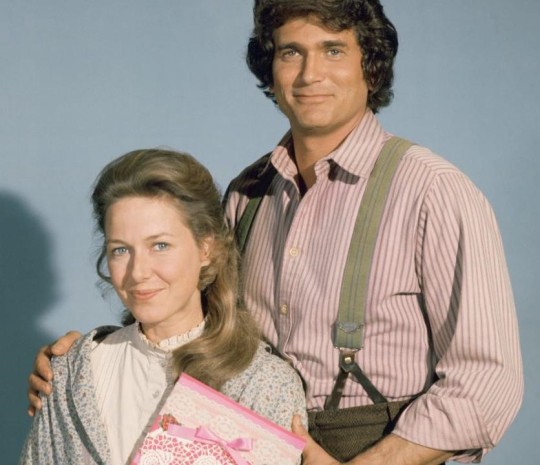
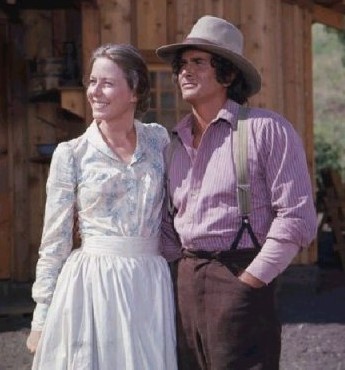
Characters: Charles Phillip Ingalls and Caroline Lake Quiner Ingalls
Media: Little House on the Prairie (1974-1982)
Played by: Michael Landon / Matthew Laborteaux and Karen Grassle / Katy Kurtzman
Setting: 1870s-1890s, Walnut Grove
*~*~*~*~*~*~*~*~*~*~
Charles Ingalls is a hard-working and Bible-believing farmer and carpenter who pioneers his way into Minnesota territory, settling his family outside the town of Walnut Grove and struggling to build a life for them amidst constant trouble.
Caroline Ingalls is Charles’ wife, and she spends her time taking in sewing, substituting for the town schoolteacher, selling eggs to the local mercantile, and taking care of their children (Mary, Laura, Carrie, Grace, and later Albert, James, and Cassandra).
Charles and Caroline never have any shortage of daily obstacles to work through, whether it be crop-destroying storms, greedy bank robbers, or gossiping townsfolk. Through it all, Charles and Caroline have a relationship built on faith, hard work, and unconditional love for one another and their family, things that are never shaken no matter what they come up against. Charles and Caroline becomes pillars in their Walnut Grove community, regularly voicing reason and decency to others and eventually learning to adapt to the times, but their love for one another is always evident no matter what they face together.
#charles x caroline#caroline x charles#charles ingalls#caroline ingalls#caroline quiner ingalls#little house on the prairie#michael landon#matthew laborteaux#karen grassle#katy kurtzman#american midwest#western#historical#comedy-drama#childhood friends#married couple#parents#farmer#teacher#café#artisan#christmas#matchmaking#ongoing ending
18 notes
·
View notes
Photo

William Cosmo Monkhouse was born on March 18, 1840. He was a British poet and critic.
Monkhouse was born and raised in London. His father, Cyril John Monkhouse, was a solicitor, and his mother's maiden name was Delafosse. Monkhouse was educated at St Paul's School, stopped his schooling at the age of seventeen to enter the board of trade as a junior supplementary clerk, from which grade he rose eventually to be the assistant-secretary to the finance department of the office. In 1870–1871 he visited South America in connection with the hospital accommodation for seamen at Valparaíso, Chile, and other ports; he served on different departmental committees, notably that of 1894–1896 on the Mercantile Marine Fund. Monkhouse was twice married: first, to Laura, daughter of James Keymer of Dartford; and, secondly, to Leonora Eliza, daughter of Commander Blount, R.N.
Cosmo Monkhouse was one of those who not only have a vocation, but an avocation. Cosmo's first bias was to poetry, and in 1865 he issued A Dream of Idleness and Other Poems, a collection strongly coloured by his admiration for Wordsworth and Tennyson. It was marked by exceptional maturity and scarcely received the recognition it deserved. Perhaps owing to this circumstance, it was not until 1890 that he put forth Corn and Poppies, a collection containing at least one memorable effort in the well-known "Dead March". Five years later, a limited edition of the striking ballad of The Christ upon the Hill appeared; it was illustrated with etchings by William Strang. After Cosmo's death, his poetical output was completed by Pasiteles the Elder and other Poems (including The Christ upon the Hill).
In 1868 Monkhouse wrote a novel A Question of Honour. Then, after preluding with a Life of Turner in the "Great Artists Series" (1879), he devoted himself almost exclusively to art criticism. Besides many contributions to the Academy, Saturday Review, Magazine of Art and other periodicals, he published volumes on The Italian Pre-Raphaelites (1887), The Earlier English Water-Colour Painters (1890 and 1897), In the National Gallery (1895) and British Contemporary Artists (1899). He wrote a monograph on the illustrator of Alice's Adventures in Wonderland entitled The Life and Work of Sir John Tenniel, R. I. (London: 1901). He was a contributor to the Dictionary of National Biography from the beginning. Monkhouse also wrote a life of Leigh Hunt in the "Great Writers Series" (1887). He wrote a monograph on Chinese ceramics entitled A history and description of Chinese Porcelain, (London; Chapman, 1901).
According to the Encyclopædia Britannica Eleventh Edition: "As an art critic, Monkhouse's judgments were highly valued. He had the rare gift of differing without offending, while he invariably secured respect for his honesty and ability. As a poet, his ambition was wide and his devotion to the art ... thorough."
Monkhouse died at Skegness on 2 July 1901.
Daily inspiration. Discover more photos at http://justforbooks.tumblr.com
9 notes
·
View notes
Note
Why is the student who takes care of Little Jack not in school also? I forgot how that came about in the story.
She’s in college. Laura was working in the mercantile after she finished school in Hope Valley. Elizabeth offered her the job babysitting Jack so she’d be able to have time to study and afford to go to school.
3 notes
·
View notes
Text
...It has now been discovered, however, that Alice (Perrers) came from a family of London goldsmiths and that her first marriage was to a man named Janyn Perrers, who Edward III described in a document from 1359 as “our jeweller.” These urban mercantile origins explain her later commercial activity, her role as a financier, and her long-term connection with jewels, as these were clearly a source of wealth she was comfortable dealing with. Following Janyn’s death in 1361, it may well have been her financial resources that enabled her to find her way into the royal household and the king’s bed. It also goes a considerable way to explaining Alice’s material ambition and supposed “avarice,” both as a potentially wealthy London widow from a competitive trade-based background who sought to increase her resources, and as a woman who did everything in her power to use financial resources to raise herself up from her humble beginnings. For Alice, the clothes and jewels that she wore, the luxury items she purchased, and the property that she owned would all have been part of how she displayed her social transformation.
-Laura Tompkins, '"Edward III's Gold Digging Mistress": Alice Perrers, Gender, and Financial Power at the English Royal Court, 1360-1377', "Women and Economic Power in Premodern Courts" (edited by Cathleen Sarti)
#alice is one of the most interesting historical women of medieval England to me#she and Seaxburh and Elizabeth of York...unparalleled#historicwomendaily#alice perrers#english history#14th century#my post#edward iii#(fuck him btw)
9 notes
·
View notes
Text
JCM Projects -- 2019
My aim is to update this at least monthly, ideally weekly with all of the projects John Cameron Mitchell will be working on, debuting, or a part of in the upcoming year. If you know of a project not listed here, please message me thru inbox or IM. | | Updated June 19th
This Week (June 19th-23rd)
(DJing) Mattachine – Monthly queer dance party with Amber Martin and Ang DiCarlo at the Julius
The Origin of Love Tour (North American) (ongoing)
New York – June 27th, at The Town Hall (3 left!)
New York – June 28th, at The Town Hall – sold out!
New York – June 29th, at The Town Hall – sold out!
New York – July 27th, two shows! at Fischer Theatre/Bard College (16 left!)
Michigan – November 2nd, at the University of Michigan, (tix on sale in Aug.)
Austin – February 7th, 2020, at University of Texas at Austin/Bass Concert Hall (tix on sale in August)
San Fransciso – February 29th, 2020, at Berkley University. (tix on sale in Aug.)
Salt Lake City – April 3rd, 2020, at Kingsbury Hall (tix on sale in July)
Los Angeles – April 11th, 2020, at UCLA/The Theatre at Ace Hotel (tix on sale in July)
more dates to come!
MERCHANDISE: Junction City Mercantile (launched! all proceeds go to helping John’s mum)
Other Concerts
New York – June 22nd, John will be singing a selection of songs from Anthem as part of the first Topic Talks: Music concert. Tickets on sale now.
TV Shows
Shrill (series regular) – Hulu, first season available now! – RENEWED!!
The Good Fight (guest star) – CBS All Access Trailer | | Sneak Peak | | Episode
Movies
Hedwig and the Angry Inch (2001) – June 25th. Critereon Collection DVD/Blu-Ray release featuring a new 4K restoration of the film, a new chat with the original creatives behind the film, a talk between Stephen Trask and Rolling Stone writer David Fricke, and all of the features from the original DVD release. Critereon.com | | bbfc certification | | watch now
How to Talk to Girls at Parties (2017) – May 8th. Transmission Films. After almost a full year since JCM was there and told that there were no immediate plans for distribution, Australia is finally getting HtTtGaP on DVD and digital.
Podcasts
Anthem: Homunculus: A ten episode podcast series written by JCM and HtTtGaP collaborator Bryan Weller and featuring performers such as Glenn Close, Patti LuPone, Madeline Brewer, and Nakhane. All episodes available. Luminary Podcasts.
Little Known Facts with Ilana Levine: Upcoming. John was interviewed on April 29th, episode presumably airs soon. iTunes | | Podbean | | Stitcher
The Orbiting Human Circus (of the Air): New episodes dropping generally 2019. A fictional series set in the world of a radio show that broadcasts from the top of the Eiffel Tower. Season one, season one remaster featuring interviews with Julian Koster and JCM, and The Second Imaginary Symphony (does not feature JCM) available now. WNYC Studios.
Too Hot For Radio: 2019. John recorded a live reading of a short story for the NPR program. If it follows past airings, it will be included sometime when the new season starts streaming later this year.
Dreamboy: an ethereal monster movie told in podcast form. JCM guest starred in the finale, aired March 25th, and sang a song. NightValePresents Website.
More John podcasts
Albums
Anthem: Homunculus (Soundtrack) – Out now. Full soundtrack currently available as a digital download from Ghostlight Records. Featuring John, Glenn Close, Patti LuPone, Nakhane, and others, written by JCM and Bryan Weller. Ghostlight Records
T-Rex Tribute Album – John will be singing ‘Diamond Meadows’ as part of producer Hal Willner’s project. No release date yet. Variety, JCM ig
Interviews
For interviews that are not really part of a podcast or other thing.
Big Think: May 18th. Video. (Different from the 9th) [ YT, BT ]
Psychology Today: May 15th. Text interview with John about one of the key plot points in Anthem. More talking about the show than actual interview. There is a more spoilery interview linked off of it relating to ep 7, though the spoiler is something that’s been hinted at in past interviews. [ PT, C ]
Big Think: May 9th. Video [ YT ]
BuzzFeed AM to DM: Daily webshow. May 2nd. [ Periscope, Twitter, BFN ]
New York Live TV/The Hub Boston: TV interview. Same interview ran on both programs. About 5 minutes. May 1st [ YT ]
Time Out Mexico: Text interview. Translated into Spanish. April 29th [ TO ]
Backstage.com: John answered questions from the people at Backstage and fan questions left on their forum and social media. April 25th. [ FB ]
Broadway.com Live at Five: John was interviewed to talk about Anthem: Homunculus and Hedwig. April 24th. [ YouTube, text write up ]
Other Projects
Come Back Once More So I Can Say Goodbye – a theatre piece by Labyrinth Dance Theatre. About gay life in NYC 1965-1995. JCM is part of Julius' Honorary Host Committee for the show. $40 gen. admission. $25 student/senior/artist. June 14-17th.
Broadway: The Next Generation – documentary. No release date yet.
Time Warp: The Greatest Cult Films of All Time – documentary. No release date yet.
TV Series 1: John has talked about this in interviews. Something that he would be writting/showrunning as well as creating. (impending)
TV Series 2: Something that John would be creating, but not as involved in the day-to-day workings of. Has talked about in interviews. (impending)
Other Appearances
Mattachine, June 20th – a monthly queer dance party at Julius’ Bar in New York. Usually the 3rd Thursday of the month, but does vary. John usually shows up, but does not go to all Mattachines. @mattachineparty UPDATED!
Filmmaker on the Edge, June 15th – John is going to be honoured with the award, have a conversation with resident artist John Waters, and screen Hedwig. (press release)
ARCHIVED
After a certain amount of time, older information will drop here so that fans looking for recent, current, and upcoming projects will have an easier time. Things that have already been done will drop down here. And going into 2020, there will be a new list.
The Origin of Love Tour
February 8th -- Washington DC, National Theatre
February 22nd -- Chicago, IL, Atheneum Theatre
March 2nd -- Boston, MA, Schubert Theatre
May 22nd -- Mexico City, MX, Auditorio BlackBerry
June 8th -- Miami, FL, The Arsht Center/Knight Hall
Other Concerts
Drop down after performance unless there’s a stream or a downloadable thing for them.
TV Shows
Shows drop down here after three months for guest appearances and six months after the last episode airs for series regular status.
Movies
Movies drop down six months after last release.
Podcasts
Podcasts that John is in the regular cast for will drop here six months after the last episode. guest starring, three months. Interview, one month.
Regular Cast
Guest Starring
Interview
Adulting: an interview format podcast where JCM and another guest star were interviewed. Broadcast live April 12th as part of a celebration for the venue. Watch video on FB | | Periscope | | Youtube
Death, Sex Money: John is guest hosting and interviewing his friend Marilyn Maye while the regular host is on maternity leave. April 17th. WYNC Studios.
Katya and Craig/Whimsically Volatile: April 25th. Podcast hosted by drag star Katya Zamolodchikova and director Craig MacNeil. This week, Craig hosted the show and interviewed John without Katya. Soundcloud | | Libsyn | | iTunes | YouTube
Selected Shorts: April 25th. John reads Fox 8 by George Saunders. Recorded November 9th of last year. NPR | | Stitcher | | SoundCloud | | player.fm
Chapo Trap House: April 29th. Podcast where John talks about Anthem, Hedwig, Shortbus, “the end of sex.” Soundcloud
Stagecraft: April 30. Podcast about acting. iTunes | | Player.fm | | Libsyn
CBS This Morning: April 30. Talks about Anthem, how being openly out in the time of AIDS informed his work, and the benefits and detriments of working in a digital age. iTunes | | Google Play | | Spotify | | Stitcher | | SoundCloud
Laura Heywood Interviews: May 8. player.fm | | Libsyn
The Frame: May 9. John has a segment talking about Anthem. iTunes | | player.fm | | NPR
Studio 360: May 14th. John and Bryan talking about Anthem and performing a live version of ‘The End of Love.’ Slate | | iTunes
Albums
If John is guest appearing on the album, it will move after four months. If it’s his project, it will move after six.
Interviews
Drops down after one month for text interviews. Three for video.
Rolling Stone Mexico and GQ Mexico: John is interviewed in both for his performance in Mexico City
Mural: May 18th. Text interview in Spanish. [ M ]
Escandala: May 15th. Text interview with John. In Spanish [ E ]
Open Revista: May 14th Text interview with John in Spanish. [ OR ]
TheatreMania: May 12. Text interview with John and Bryan Weller about Anthem. [ TM ]
Metro Source: May 10th. Text interview with John about Anthem. [ MS ]
Time Out: May 9th. Press release/info for Orbital DJing Event [ TO ]
Daily Beast: May 6th. Text interview. [ DB ]
Rolling Stone: Text interview with John and Glenn Close about Anthem. May 5th [ RS ]
Backstage.com: write up of the FB/IG live video that John did the previous week. May 1st [ Backstage ]
Forbes: Text interview about Anthem and transforming it from the Hedwig sequel. John also talks about his writing process, The Orbiting Human Circus, and which Broadway shows he’s excited by this season. April 26th [ Forbes ]
NewNowNext: Text interview. April 23rd. [ NNN ]
Observer: Text interview. April 23rd. [ Observer ]
Queerty: Text interview. April 20th. [ Queerty ]
New York Times: Text interview. April 19th. [ NYT ]
Other Projects
Unless John is featured heavily, these will drop down after a month or two. These projects might also be less available than some of the other programs.
Other Appearances
Too Hot For Radio – January 26th, as part of San Francisco SketchFest, John went out and read a story for NPR’s Selected Shorts radio program. Eventually it will air via streaming like iTunes, NPR’s website, SoundCloud....
JCM interviews Claywoman – March 17th, John participated in a performance art interview of a drag character reported to be the oldest being in the universe who has travelled to our planet from her own.
JCM screens Entertaining Mr. Sloane – March 19th, John screened one of his favourite movies, a British sex comedy called Entertaining Mr. Sloane as part of a Quad Cinema series.
Various Promotion – various times in January thru March, John was on location being interviewed to promote Shrill. These appearances include the Hulu winter TCAs, the New York Shrill premiere, and San Francisco SketchFest.
Jay Brannon, Joe’s Pub – April 9th, John announced attending concert. Presumably did not perform.
Club Cumming – April 15th, John made his first appearance at Club Cumming as part of a star studded benefit for New Alternatives, an LGBT Youth charity. Sold out!
SirusFM//Signal Boost Show – April 25th, interview about Anthem, Hedwig, Uber rides, and sex.
Tribeca Celebrates Pride – May 4th, John was interviewed his Shrill costar Patti Hardison about how his queer identity has affected his work.
Chocolate Babies screening – May 7th. John announced on ig that he was going to be attending a screening of Stephen Winter’s film.
Orbital – May 24th. John and Amber DJed at the Ortibal dance party in Mexico.
Tony Awards - June 9th. Guest.
Nahkane, The Illustrious Blacks - June 20th. John announced on ig he would be attended Nahkane’s performance before June’s Mattachine Party.
#john cameron mitchell#hedwig and the angry inch#hedwig#shrill#the good fight#anthem#hatai#mattachine#anthem homunculus#dreamboy#the origin of love#club cumming#orbiting human circus#the orbiting human circus#orbiting human circus (of the air)#wnyc#jcm
35 notes
·
View notes
Text
“Something’s happening, isn’t it, Margaret?” Twin Peaks Recap, Season 2, Episodes 6 & 7.
Given the nature of these episodes, and what will need to be discussed from here on out, I’m putting a spoiler warning on this. (I mean, I intended these to be for people like myself who’ve watched the show before anyway, but just on the off-chance you’ve been reading along and this is new to you... if I were you, I’d stop now. You’ve been warned.)
Episode Six, “Demons”:
-”I thought you were different!” Harold’s whole speech here, with its references to ‘contamination’, ‘betrayal’, etc.-- he isn’t really talking to Donna or Maddy.
-Audrey on being rescued, “I prayed you would come.” Not for nothing, the song the little girl plays on her radio in Episode 8 of The Return is “My Prayer” by The Platters... Also love Coop’s delivery of “Goodnight, Mr. Horne.”
-I have in my notes: “GORDON!!!” Gordon Cole, of course.
-The scene between Maddy and James-- her clothes in this scene are very ‘grown up’: the wool coat, the long scarf. (More on this later...)
-Josie and Ben Horne: I haven’t said much on this storyline to date because it feels so separate from everything else, but I do like them in this scene.
-aside, inspired by the pizza at Leo’s ‘homecoming’-- wonder what kind of weird s%^& you’d see as a pizza delivery driver in Twin Peaks...
-Pete. Martell. Can we just have a word for how gol-danged lovable Pete Martell is?
-and finally, the One-Armed Man (I forgot how long this thread drags out). Again, really like Al Strobel’s performance in this scene; really brings back the darkness and menace of the situation.
Episode Seven, “Lonely Souls”:
-Maddy talking about her job and her apartment-- as I think I’ve mentioned, I grew up in Missoula. There’s a brick apartment building right next to the high school I attended, in one of the oldest parts of downtown. I imagine her living there-- going for sandwiches at Worden’s Market sometimes, shopping in the old Missoula Mercantile building (in the early 90s, it was The Bon Marche. It smelled like perfume and face powder, and I thought it was the most sophisticated place in town)...
-”Good thing Andy didn’t see this one.” Bless you, Hawk.
-Ben & Audrey-- worth noting that he is honest with her, and does seem genuinely horrified that she was ‘Prudence’.
-Sarah Palmer, crawling down the stairs. It’s so much worse when you know what’s coming.
-”There are owls in the Roadhouse.” Somehow I’d forgotten that Margaret goes with Harry and Coop. (Also notice ‘the waiter’ sitting next to Mike and Bobby)
-James and Donna. They’re so good when they’re together.
-And we see it, finally: BOB and Leland and poor sweet Maddy. This scene is just... It’s awful. Really nasty and terrifying and awful. Obviously yes, they lucked out with Sheryl Lee’s superb, ethereal scream, but even without that, it’s a remarkable horror sequence. The way he grabs her and holds her, the way BOB kisses her and Leland whimpers, “Laura, my baby...” This is something I’ve thought about a lot: Laura was growing up. She wasn’t a little girl anymore-- in some ways, was desperate not to be (the drugs, the cigarettes, working at One-Eyed Jack’s). In the same way, as I’ve touched on previously, Maddy was trying to leave, trying to have her own life. Aside from all of the supernatural stuff, this is a really sharp look at the way abuse works.
-”It is happening again.”/ “I’m so sorry.” Another sharp detail: The Giant and his brethren being unable to intervene directly. (Again, something to return to in future installments.)
That’s it for now; stay tuned. We’ve got a long stretch ahead, I may batch these up differently just to keep myself sane. (I am watching *all* of Season 2 again, just to satisfy my completist urges, so again, you’ve been warned.)
1 note
·
View note
Text
S6E2: Phone Rings & Heartstrings (Episode Write-Up)
You can also read this on my site here.
And here we are at the beginning of another new season! How do you feel? Like it’s been forever? Like it’s been little more than the blink of an eye? I know for me it’s a combination of both. It’s crazy to think a year has passed since S5! But we’ve made it to the next chapter of When Calls the Heart! I wonder what this season will have in store for us?
Plotlines for this episode:
Motherhood
Laura & College
The Telephone Comes to Hope Valley
Rosemary Plays Cupid
Jesse and Clara
The Saloon Closes
Not related to the episode exactly, but I noticed they didn’t reference Jack’s death directly in the “last time” clip. For a second, I thought they weren’t even going to let him have a speaking line, but they gave him half of a sentence. Also unrelated, the new part of the intro is great! I just wonder why they didn’t take the time to do new character bits for the characters, while they were at it. Some of these are pretty outdated.
So here we are at:
Plot #1: Motherhood!
I’ll admit that I was dreading this part a little bit. It’s hard to say where the line is between “teacher” and “mother.” I was afraid one might eclipse the other (and you know which one would be doing the eclipsing, because this is Hallmark). That said, I think overall they did a pretty good job of including the baby without making him this big overwhelming part of the actual story.
So, we find out that Jack Junior is four months old, making it almost May 1916.
The general ‘plot’ here is as follows: Elizabeth has to go back to work and finds it difficult. Molly, Rosemary, Florence, and Clara have agreed to take turns watching the baby, but it bothers Elizabeth that little Jack won’t have a more concrete schedule; she’d rather have a more stable arrangement.
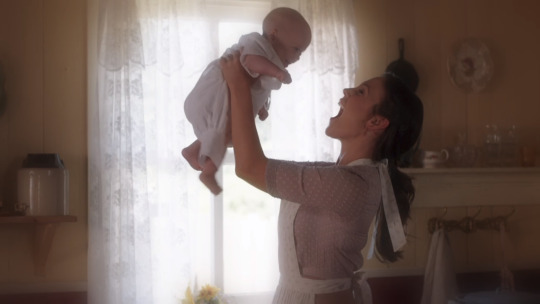
This isn’t a very long or detailed plot, but it works. Everyone I know who had to go back to work bawled their eyes out when they had to drop their babies off at daycare. I know I would! Elizabeth finding it hard to balance being a mother and a teacher makes sense, but the best part about this is that she doesn’t consider quitting teaching for even a second.
First, I think it’s fair to say she needs the money, but second…she loves it! How can she balance Jack with teaching in a way that feels satisfying? That tells her that her child is getting the best arrangement she can afford while also allowing her to work to provide both the necessities and fun things?
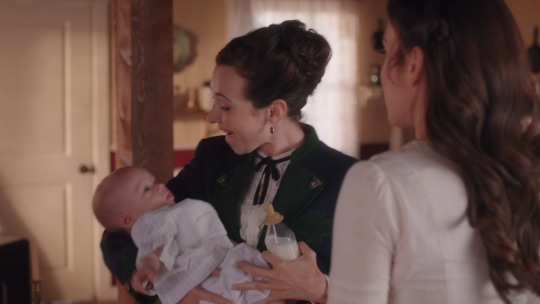
Elizabeth’s slight clinginess isn’t really a shock or a surprise to me. It’s natural. She spent four months doing whatever she wanted with her life and her baby, and to have to hand him over to someone else every day for hours and hours… Well, it wouldn’t feel good.
I think the best part of this plot was that, like I said earlier, it wasn’t overdone. Nothing about it felt overdramatic or unnecessary.
And it wrapped up neatly with the next plot on the list:
Plot #2: Laura & College
Laura is out of school, now. In my opinion, it’s definitely that time. She’s gotta be about 15 or 16 by this point, and that’s when education ended for the majority of people. And it’s nice to get to see that transition, because with characters like Gabe, we just didn’t get it.
Free from the constraints of having to be in the classroom, Laura’s taken a job to help out her dad: working part-time at the mercantile. She loves to read, and devours the books Elizabeth loans her, but she’s given up on the idea of college. It costs too much money, and her dad needs her help.
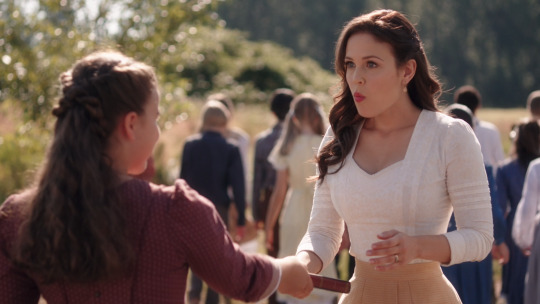
Elizabeth, determined to find a way to make it work, writes to an acquaintance of hers who is an administrator of a preparatory school in Hamilton. She includes Laura’s grades and a recommendation letter.
Laura is accepted as a corresponding (or correspondence) student! It’ll let her study at home and send in her work (or maybe let her do it under Elizabeth’s supervision), so she’s still free to work and help her dad around the farm.
Unfortunately that leaves her little time to do her schoolwork…
So Elizabeth offers a solution that will benefit them both: Laura can be Jack Junior’s nanny! Then she’ll have a little downtime to work on her schoolwork, and it’ll pay more because it’ll be full-time.
Laura accepts the deal!
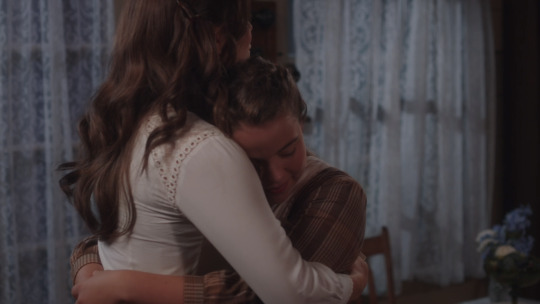
Again, this plot wasn’t huge or convoluted; it wasn’t dramatic. It was nice! And I loved how the general ‘motherhood concerns’ plot tied into this one. It didn’t need to be heavily intertwined at all. They just needed to connect. Which they did, and quite well.
That said, I don’t know if I’d trust a 15/16-year-old girl with no real babysitting experience to be full-time nanny of my baby! In that way, the solution is…maybe just a pinch too convenient? Wilma was established as being poor, and with a school-age child, maybe she would have been a better choice.
But I can’t deny that there’s a lot of room for future drama with this, too. Laura will have the opportunity to grow as a student and as a nanny! Maybe she’ll make mistakes. Maybe she’ll almost regret accepting it. Maybe… Well, it just leaves things open for some good future potential!
Plot #3: The Telephone Comes to Hope Valley
This plot isn’t really a very big deal, mostly because they skipped through all of the potential drama that would have happened when Abigail had to get people to actually bring the telephone to town. I guess at least Henry mentions that it couldn’t have been easy—and, on the plus side, too, it seems that any of the drama Abigail went through to get the phone there? Was kept from everyone else.
So… the telephone is coming to Hope Valley! There will be a line in the mercantile, the mayor’s office, the jail, and Lee’s office. As Henry says, that’s a good start!
The drama here is all good-natured. Ned tells the company he can definitely figure out the wiring, but uh…he can’t.

He really can’t. He has no idea what he’s looking at, and the directions are confusing…so the big reveal for their four o’clock call is an awkward silent mess. Embarrassing, but also funny in a mostly good-natured sort of way.
The telephone company sends Fiona Miller to straighten things out, which she does, and not without a little sass (or uh, flashin’ a li’l ankle)! She’s easy to like. I hope she sticks around past the second episode, personally, but I can’t quite figure out if she’s meant to be a longstanding cast member or just one of those “couple of episode” characters. It’s easy to imagine it going either way.
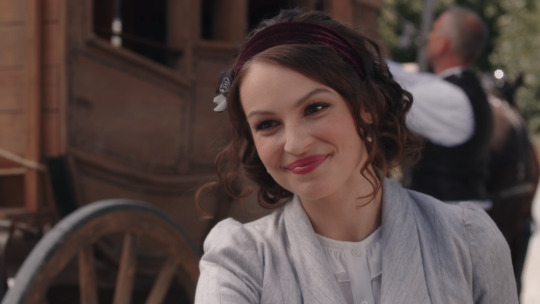
Anyway, she fixes things right on up, the phone rings, and Abigail answers it.
Again, another…rather calm plot. It’s giving us a nice set-up for future plotlines by giving the cast access to a telephone. So who knows how things might go? It could be interesting.
That said, the one thing about this plot that I didn’t care for? Bill’s role as a curmudgeon. Was that really necessary? S1 through S4 Bill was a little tactless/thoughtless sometimes, and not emotionally open, but S5 and S6 Bill have been almost unbearably awful. I’ll talk more about this later, but the slight role he played here in this particular plot doesn’t even make sense for his character. He lived in the city for the majority of his life.

I’ll forgive this particular folly if the writers take it in an interesting direction—like Bill being phone-shy (because, for example, he relies a lot on body language/facial expression to have a conversation and gets super awkward on the phone, so he prefers wires due to it giving him the ability to think through what he needs to say and write it down to send). Otherwise it just comes off as more of the same with regards to the figgy pudding plot in the Christmas film: he’s just there to laugh at.
I’m worried that that’ll be the new norm, though. Incoming horrible joke: Bill shouting loudly into the telephone like he’s never used one before. (UGH. Just typing that gave me hives.)
Plot #4: Rosemary Plays Cupid
Now this plot was fun. It was also quiet, kind of muted, not really long, and definitely not meaty. But it served its purpose well. It also gave us some seriously awkward stuff to cringe over that wasn’t Bill’s character. Thank goodness!
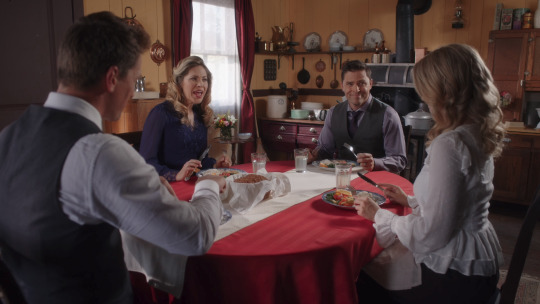
So the gist of it is pretty simple: Rosemary decides that Faith and Carson have good teamworking skills, so she ambus—I mean, uh…sets them up! At her house, for dinner! Where everything ends up being awkward and weird, and all Faith and Carson talk about are…beans.
That’s right.
Beans.
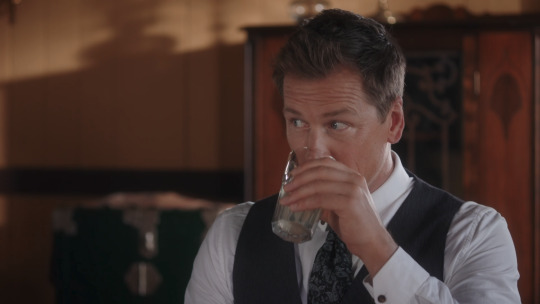
Faith eats lots of beans because she can’t cook worth anything, and Carson…does not consume beans. Because they make him gassy. Great dinner conversation!
Afterward, Faith and Carson start to bond a little over how awkward the dinner was (I mean, nothing brings a couple together like complaining about being set up, right?), but Carson gets carried away and says, “Doesn’t she realize how ridiculous that would be?”

Carson was probably trying to make things not-awkward, but all he did was make things…extremely awkward. The worst part (or best part, if we’re talking about the great acting these two did) was how Faith’s face the entire time is kind of like, “Oh crap, I can imagine it…and it’s not bad at all” and Carson drops that “ridiculous” line right on top of it, hurting Faith’s feelings and making everything between them vaguely awful.
Which we didn’t get too much of in this episode. They literally run into each other in the clinic and it’s awkward, but Carson just seems confused about it, and Faith is the one being avoidant.
Rosemary thinks her entire plan was a disaster, but…
Well, we know she got the ball rolling. ;)
Plot #5: Jesse and Clara
I love Jesse and Clara, and here they get a nice, simple little plotline that feels like it’s getting solved in a reasonable amount of time. They’re also both very cute the whole time.
Jesse purchases some land, which comes as a (pleasant) surprise to Clara. He takes her around pointing out where he’d like different buildings to go, and uses the pronoun ‘our’ to describe the barn. When Clara brings it up (“Our barn?”) Jesse responds in the affirmative (“Of course…our barn.”).
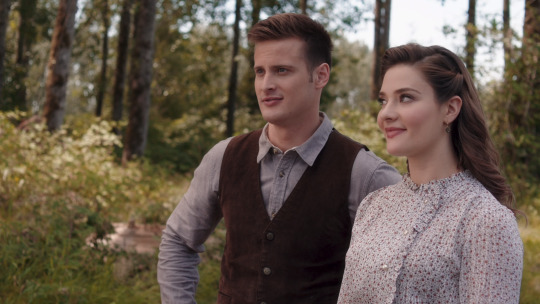
Unfortunately Clara thinks this is the beginning of a marriage proposal, but…it’s not. Jesse says it’ll happen eventually, but he wants to be more stable. Clara accepts this, but…it bothers her, so she talks to Abigail about it. Abigail’s advice is mostly to just…talk to Jesse about it, so Clara makes the effort, and Jesse pretty much just repeats himself: he wants to be in a better financial state.
Clara isn’t persuaded by this, because Jesse has a good job already, and gets kind of short/snippy with him. Jesse ends up coming forward and confessing that when he was younger he stole from a general store with some friends and he’s still paying the man back (the parts that his friends got away with).
All is forgiven when he admits that he wants to start with a clean slate: the real reason he hasn’t proposed yet. He doesn’t want something like that marring the beginning of their marriage together. He wants to prove that he’s a better man by making things right where he should, first.

All in all, a pretty good plot. Reasonable. Clara’s disappointment in not getting a proposal was more than understandable. They’ve been courting a long time, so I don’t blame her for thinking it had finally arrived only for it to just be generalized talk.
That said, this could have definitely been a bigger plot? So I’m surprised they left it as just this little thing. Him sending away $10/month could come across as a lot of things if anyone saw him doing it. But props to keeping this storyline simple! The only thing I think I would change is…maybe having Jesse talk to someone else in town he trusts (could have been just about anyone; if Dottie were around I’d probably suggest her, but Lee or Bill would be a good choice, too) to get the incentive to confess the truth to Clara. Even just a small scene where he looks thoughtful, maybe talks to himself a little in that ‘do I tell her’ ‘do I not’ way and then decisively puts down his tools and walks toward town would have gone a long way into making it seem like he was telling her for more reasons than because she’s being snippy and short with him.
Overall, though, a sweet and enjoyable plot. Jesse calling Clara m’dear was so cute it nearly killed me instantly.
Plot #6: The Saloon Closes
This was the meatiest plot of the episode by far, and with good reason: Tom Trevoy’s mother took ill (in a long-term sense), so he and his wife moved to Union City, but he keeps traveling back to Hope Valley to oversee his saloon, but the commute is awful and he isn’t with his family as much as he’d like, so…he decides to sell.
It’s an incredibly profitable business—or at least it has the potential to be, being the only saloon in town, as Henry mentions to Lee—so the fact that it’s going up for sale is a Pretty Big Deal.
Or at least, it is to Bill and Henry.
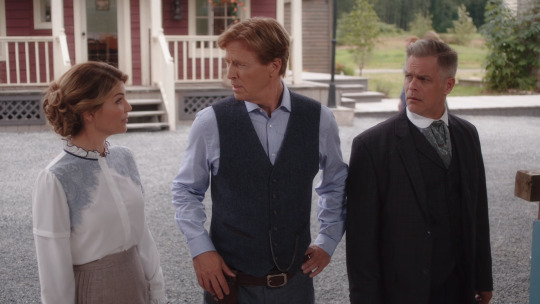
The short of it is that they both have half the funds ($4,500) and try to get Lee to cough up the other half for a partnership. Lee tells both of them he’ll have to discuss it with Rosemary first. Rosemary (more or less) talks both men into making this venture about her, because of course doing so will get them her approval (even though it’s clear neither of them really want to do these things for her). In the end, she and Lee are split about who they should choose. Rosemary thinks Bill is the safer investment; Lee would like to trust Henry. They disagree so thoroughly that they decide together to not partner with either of them, which leaves Bill and Henry to, uh, partner with one another. They hate the idea but end up talking about it. Unfortunately, they get their money together too late; Tom sells the bar for $1,000 over asking price to an out of town buyer.
How did the out of town buyer even find out about it in less than two days? Who knows.
Suspension of disbelief? Sure, okay. I can buy it easily enough.
Anyway, overall this plot is pretty good. Bill and Henry both make great points about one another: Bill might do the books for the café (we’ve seen him doing this), but he doesn’t oversee daily operations; he’s more or less a silent partner. Henry is definitely a businessman, but he’s had past issues with honesty and, uh, money.

They’re both risks for very different reasons.
But also, they don’t like each other, so it makes sense that they’d make these kinds of digs at each other in order to try and get the upper hand.
I think my favorite part about this plot was at the end when they were working together to try and buy the saloon. I wish we could have gotten that conversation on-screen, though; it would have been great. I’m sure it was mostly about the fact that the investment is pretty sound, they almost can’t lose with it, and do they really want to wait and let someone else buy it? At least if they own it, they can control what happens/how the space is used/et cetera.
Henry and Bill disagree on most things, but neither of them is stupid.

Henry doesn’t know enough about that type of business to be of much use actually doing the physical work involved in keeping it up and running, but he could be great at striking deals and keeping track of profits/loss. Bill knows enough about balancing books to see if Henry’s up to no good, but he’s also a very hands-on kind of guy, so I feel like he could do all right with the ground level kinds of things.
Still, I feel like a partnership between them would go belly-up pretty fast. They just don’t get along in other capacities enough to…make it work long-term, I think.
It’s definitely for the best that someone else bought it up.
But hey, for a second we were able to see Bill and Henry getting along!
Miscellaneous Thoughts:
Molly…had a hair appointment…in…Benson Hills… What? These women are not rich. That was a bad line. Literally anything else could have sufficed. She went to Benson Hills to get a pretty fabric she couldn’t get in town, for example. Or she went there to drop off donations for a church drive. There are so many other things they could have picked that wouldn’t seem ridiculous (not to mention unbelievably shallow in this time period).
Tom…HAS A WIFE???? We’re probably meant to think she’s been around from the beginning, but now it makes me sad she wasn’t around… The saloon owner’s wife could have been a really fun role for somebody to play!
Now, I promised I’d get back to it, so here we go: Bill was easily the worst part about this episode, and the sad thing is, like I’ve said before, he’s my favorite (regular) character! I don’t know why they decided to suddenly swerve Bill into old grumpy-gus curmudgeon territory, but so far there’s been no reason for it; it makes him hard to like and undoes all the character development he went through in the first four seasons. I don’t want to spit out a 3,000-word essay rant about why I hate this, but I figure it deserves a serious mention here, too. I hope this series isn’t going in the direction of making Bill the go-to laugh-at character. That isn’t good humor writing. It’s cheap and lazy. Please don’t let me down, writers.
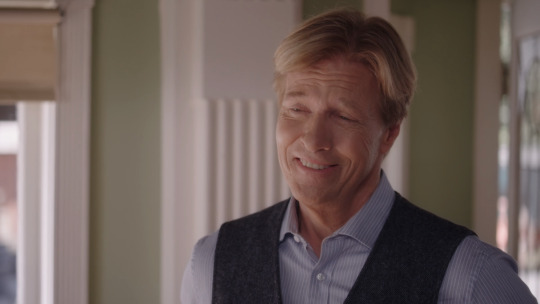
Also, can I just say how cringey the weird “charming” parts were with Bill in them? You know what I’m talking about. These parts. UGH. They were terrible and weird. I’m not sure what was going on there; it almost feels like bad stage direction. Bill hasn’t done that since Season 2, and even then it was part of a persona he eventually ended up shedding (along with his job as a Mountie). Why bring it back now? It, too, undoes character development. I’ll be keeping a close eye on this.
There were so many random children…I’ve never seen before. I just wanted to point it out.
Why does only Abigail get the ‘modern’ looking telephone?
Baby Jack was cuter in this episode than in most of the stills, and Elizabeth’s nightgown was lovely.
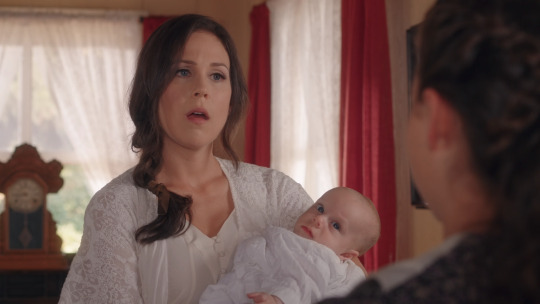
Florence’s expressions aimed at Elizabeth for not leaving fast enough? Priceless. I mean, that’s a good spot of humor there. Nobody is mocking Elizabeth for having feelings, but we can have a good little chuckle at it.
Lee getting busted pretending to take a phone call was so cringey but mostly in a decent way? I don’t think Bill is so tactless he wouldn’t realize what Lee was doing (see my rant about Bill above) but it’s a situation we can all probably relate to a little bit. Nobody likes getting busted for practicing! A better way of doing this scene would be for Bill to look concerned, or amused? Like, “Who are you talking to?” or, “Talking to yourself?” to start out, with no condescension in his tone of voice. But…that’s just me.
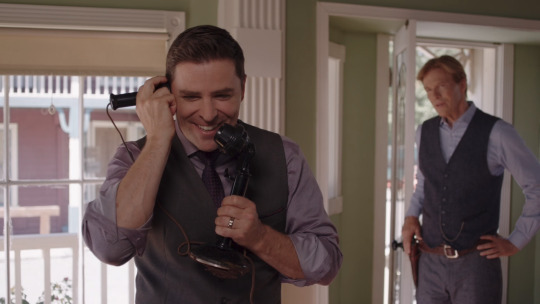
Overall Thoughts:
This was a good first regular episode to the season. It definitely gives me hope about the episodes to come! Bring on the good content!
5 notes
·
View notes
Text
Musings on Race in Fantasy or: Why Ron Weasley isn't Black
Blogger’s Note: This particular article is kind of funny in retrospect, now that drawing black!Harry and black!Hermione has become so common in the fandom.
Last year (or maybe the year before, time flies doesn't it), the Sci Fi channel produced an adaptation of Ursula le Guin's Earthsea stories. It caused something of a furore, because most of the main characters were white. I mention this for two reasons.
The first reason is that the TV company, with typical mealy-mouthed style, insisted that they had practiced "colourblind" casting and in a stunning manipulation of middle class guilt, immediately implied that it was somehow racist to expect them to cast a Native American in the role, just because that was the real world ethnicity which most closely approximated that of the people of Earthsea. Obviously the white guy just happened to be the best guy for the role, obviously he stood out by a mile over the other contenders.
The second reason I mention it, though, was because when I read the books (many years ago now) I had completely failed to notice that Ged wasn't white. With the white middle class man's ingrained fear of being labelled a racist, I immediately constructed for myself very much the kind of justifications that the Sci-Fi channel had. "Oh well it's all about the character isn't it, Ged's character is the same whether he's black, white or whatever".
The thing is: it's natural for people to assume that a fictional character of unspecified race is the same race as them. Similarly I have a strong memory of seeing a picture in my year nine RE class of a depiction of Jesus from a church in China. Their version of Jesus, of course, looked Chinese, which broke a few of our tiny fourteen year old brains. Jesus is Chinese in China, black in Africa, Caucasian in England. He might even be Jewish somewhere, but that seems rather unlikely.
But there's another thing. I, yes, will generally assume that a non-racially-specific person is white. And I'm pretty sure that a Chinese person reading a book written in Chinese by a Chinese author will assume that a non-racially-specific person (who will probably have a vaguely Chinese sounding name and live in a fictional setting that looks pretty much like medieval China) would be ethnically Chinese. My girlfriend pointed out over lunch that, when she reads Haruki Murakami, she imagines all the characters as white, even though they're presumably mostly Japanese. It gets more complicated when you put minorities into the mix.
Put simply, I cannot put my hand on my heart and say that a black person living in England has the same luxury that I - and Chinese people in China, and Indians in India - enjoy. I, and I would imagine a great many other people who read the Earthsea books at a similar age to me, assumed Ged was the same race as me. I sincerely doubt that there are any black fantasy readers who made the same assumption about Aragorn when they read Lord of the Rings.
Currently, then, I'm in one of those horrible situations where I think there's a point to be made, but I'm not entirely sure what it is. It's one of those "individual instance versus general trend" problems. I don't think you can look at any single work of fiction and say "that character, right there, should have been black". It's all very well saying that non-whites are underrepresented in Fantasy, but that's partly just because ninety percent of fantasy is set in a world that's functionally identical to medieval Europe. Most fantasy worlds do have black people in them, it's just that because they come from the Hot Continent In The South. Indeed most fantasy worlds seem to assume the existence of exactly four races: White Anglo Saxon, Black African, Asian (the Asian culture will invariably be a vast Empire in the East, and usually look like Han Dynasty China, plus Samurai, plus ninjas) and Arab (the Arabic culture will be either very religious or very mercantile, or both).
In fact, the races that are the most underrepresented in Fantasy are - arguably - the non-Anglo-Saxon "white" races. A remarkable number of Fantasy settings include quasi-Venetian city-states, quasi-Roman empires and quasi-Spartan warrior cultures, who none the less manage to look remarkably like they were born in Colchester, nary a Mediterranean complexion in sight. I can just about accept a quasi-European world with no black people in it (Fantasy worlds don't haveimmigration after all). It's rather harder to accept a fantasy analogue of Florence in which nobody looks Florentine. (This weird omission applies almost universally in fact: when was the last time you saw a Roman Emperor actually being played by a Roman? Why when it is unthinkable for a white man to play Othello does nobody bother to find a Venetian-looking Desdemona).
Of course I might be making a fuss about nothing. As I say, it's easy for me to assume that everybody I read about is white (even when there's textual evidence to the contrary). I don't really have any evidence that Locke Lamora isn't Latino, or that the men of Westeros aren't Hispanic (the Dornishmen are, of course, Generically Arabic but like most fantasy worlds, Westeros seems to have an invisible line across the equator, with the people going from "white as milk" on one side to "coffee-coloured" on the other with no in-between). So maybe it isn't a problem with the genre, maybe it's a problem with me. There is, after all, nothing stopping me from imagining Robert Baratheon as looking like a Greek Cypriot, or Ron Weasley as being a black kid who just happens to have red hair. If I assume that a character of unspecified race is Caucasian, that's my look out.
The problem is, though, that if I am making the assumption that J Random Character is white, just because I am white, then it seems overwhelmingly probable that the white middle class writers of fantasy are making the same assumptions. And I think this is an issue. When JK Rowling was designing her boy wizard (and I really don't mean to single her out here, it's just a good, well known example) I'm sure it didn't even occur to her that Harry Potter could be a black kid, any more than it occurred to me that he would be. When she was designing Ron Weasley, she imagined a character that would be her ideal image of an honest, supportive friend, and what she wound up imagining was a boy with red hair and freckles.
And it's that more than anything else that causes the trouble.
The problem with "race" in fiction in general and fantasy in particular, is that it has two very distinct implications. The first implication is the social and political one " "black" and "white" carry tremendous social connotations in the real world, and that bleeds over into created worlds as well. The second implication of a character's race, though, is much more prosaic. A person's race affects what they look like.
Well, duh.
But actually, it's the cosmetic implications of race that wind up being the most important. It is considered absolutely and unambiguously wrong in the modern world to judge somebody by their race. It is considered totally okay to judge somebody by their looks, particularly in a work of fiction, where somebody's physical appearance is often expected to tell you something about their personality. Ron Weasley has red hair and freckles: the average reader knows instantly what that is supposed to imply about him. He's boyish, a little impetuous, but basically a good person. He has "hero's sidekick" written all over him. The problem is, having "red hair and freckles" effectively precludes Ron Weasley from being black, because very few black people have red hair (although it isn't unheard of) and black skin tends to freckle far less visibly than white skin.
Again, just to be clear, I'm not saying that JK Rowling is "a racist" but I am saying that when JK Rowling formed in her mind the image of a true and decent friend, she deliberately gave that person particular physical characteristics which she felt created the appropriate image, and those traits are traits you are very, very unlikely to find in a black person.
Try to write a description of a beautiful woman, and the odds are better than even that you'll make her tall and slender with long, golden hair. Chances are, you'll make her tall and slender with long golden hair even if you're more into brunettes. "Tall and slender with long golden hair" is our cultural shorthand for beauty - it's what Cinderella looks like, it's what Rapunzel looks like, it's what Laura Fairlie looks like, Sweeney Todd's dead wife and lost daughter are both "beautiful and pale, with yellow hair". Snow White's a brunette, but she's still got skin as white as snow. No writer would dream of suggesting that a black person couldn't be beautiful, but our "generic" idea of beauty is pale and blonde, just like our "generic" idea of boyish charm is a freckly redhead and our "generic" idea of a wise man is a white guy with a long beard and a pointed nose (I'll talk about noses more in a bit).
The "race affects how you look" issue is also another strike, I think, against the idea that I only assume that everybody in Fantasy is white because I'm a white man myself. When people talk about "race" they tend to just think in terms of skin colour, but of course it actually affects a whole lot more than that. I can't think of a single point in the Potter books where it explicitly says that Dumbledore or Harry are white (so you could argue that it's just my preconceptions coming into play), but race isn't just about skin colour. Harry Potter is famous for his messy, floppy hair (again, it's a characteristic that makes him seem more like "a regular kid" - or at least a regular white kid). Dumbledore, of course, has his long, pointy nose. Even if their skin colour isn't mentioned explicitly, neither of these physical characteristics are terribly likely to be possessed by a black man. There are exceptions, of course, but in general black people don't have "floppy" hair or pointed noses. All in all I feel confident that, when I assume a character in a fantasy novel is white, the author is making the exact same assumption.
I've just spent about 1700 words slating Fantasy writers for not including enough black people in their books (and certainly not including enough Latino or Greek people despite a great many settings looking a whole hell of a lot like Spain, Greece or Italy), but I'd like to spend a moment backpedalling. The thing is that what I said at the start, about it being natural to assume that a person of non-specific race looks pretty much like you still holds. If I was a Fantasy writer I am damned sure that I'd make my protagonists white, just because it wouldn't occur to me to do otherwise. If I had to write about a beautiful woman, you can bet your arse I'd make her tall and slender with long golden hair, because that's how I instinctively think of a "beautiful woman" looking (even though I do, in fact, far prefer dark women in real life).
The other problem with race in Fantasy is that, because it's not our world, you can't use nationality as a short hand. It's actually remarkably hard to describe many non-white races without resorting to (a) cliche or (b) rather dubious ethnic stereotypes. You can get away with it fairly easily in something set in the real world, because you can just say somebody is "Chinese" or "Azerbaijani" and either people will know what you mean, or they can look it up on the internet. In a fantasy world you don't have that luxury. This is probably why there are only four races in most fantasy worlds. Anybody whose race isn't described is white. Anybody who has dark skin is Generically Arabic, anybody who has very dark or black skin is black, and anybody who has a long moustache or does Kung Fu is Asian. Some fantasy worlds similarly include a quasi-Mongolian culture, who we know to look Mongolian because they have a close relationship with their horses. You might, if you're very lucky get "olive skinned" people (who are presumably therefore green) tending Big Fields of Ancient Wheat, but that's about your lot. Again however, I wonder how much more Fantasy writers can realistically be expected to do.
The simple fact is that the real world is unimaginably complicated. A fantasy series is praised for its worldbuilding if it contains more than six moderately well realised nations. The CIA World Factbook lists the real world as containing over two hundred and sixty. Similarly, while fantasy worlds may grossly oversimplify the concept of ethnicity, it would be impossible to do otherwise - just looking at the CIA world factbook again, we see (for example) seven distinct ethnicities depicted as existing within Albania alone (Albanian, Greek, Vlach, Roma, Serb, Macedonian, Bulgarian) while the entry for China lists eleven (Han Chinese, Zhuang, Uygar, Hui, Yi, Tibetan, Miao, Manchu, Mongol, Buyi, Korean). The complexities of real-world ethnic diversity are beyond even the most talented of fantasy authors, never mind your average Quest-and-McGuffin merchant.
In the end, then, the thing I find most upsetting about the appallingly whitewashed nature of most fantasy settings is that I can absolutely understand why they're like that. Even though I'm a thoroughly modern, thoroughly liberal man, even though I work in an international school am therefore able to feel smug and cosmopolitan because I know what people from Kazakhstan look like and have a reasonable chance of identifying an Azerbaijani accent I still, deep down, instinctively assume that "person" means "white person", and I can't ultimately condemn JK Rowling for giving her white protagonist a white best friend and a white mentor, and having them marry a couple of nice white girls and have nice white kids who they named after their dead white relatives. I know I'd do exactly the same.
The sad fact is that most white people don't think about race that much, because we simply don't have to. While this is arguably better than being actively racist it's still kind of a sorry state of affairs, and it's unbelievably pathetic that after all these years, Ursula le Guin is still pretty much the only person in the industry who seems to give a shit.
Themes: J.K. Rowling, Books, Minority Warrior
~
bookmark this with - facebook - delicious - digg - stumbleupon - reddit
~
Comments (go to latest)
Arthur B at 00:49 on 2008-03-15
The amazing thing about the racial mix in Earthsea is how many people completely miss it, despite le Guin's valiant efforts in throwing out evidence pointing towards it. The only other author I can think of who's played with people's cultural stereotypes in this way is (big surprise coming here) Gene Wolfe; in The Book of the New Sun you need to pay attention to notice that Severian lives somewhere near where Buenos Aires is in our own time, that the Commonwealth it is a part of is South America, and that the Maoist-flavoured despotism threatening the Commonwealth exists in North America; the average fantasy reader (in the Anglo-American world, at least) is going to tend to assume that Our Hero lives in the northern hemisphere and that slogan-spouting Maoists are Chinese.
permalink - go to top
Guy at 04:34 on 2008-03-15
I remember it coming as quite a shock to me when I read Wizard of Earthsea to discover that Ged was dark-skinned. I'd already formed a picture of him in my mind and it was disconcerting to be told that this picture was wrong. It did make me think about race in fantasy worlds, though... later I read an essay by le Guin in which she said she did this deliberately... the idea being to try to secure the reader's identification with the protagonist before letting them in on what that protagonist looked like. I think maybe the reason fantasy worlds tend to be so ethnically homogeneous is that they're mostly seen as (and used as, probably) an escapist outlet and we don't like difficult social questions in our escapist fluff. I imagine a similar racial mix can be found in Mills and Boon novels, for example? I think le Guin is one of those fantasy (and sci-fi) writers who is intent on doing more than providing formulaic escapism and showing what the genre is capable of extending to... it's a shame there aren't more like her. I think escapism is great, but I'd hate to think that was all the fantasy genre had to offer.
permalink - go to top
Dan H at 10:08 on 2008-03-15
As I say, I can actually forgive fantasy for not handling race well, because it's actually very hard to do well, and I can certainly forgive purveyors of light, escapist fantasy for not dealing with complex real-world social issues.
On the other hand it kind of does bug me that - say - JK Rowling has an all-white cast saving their 99% white world from all-white villains and then gets praised for (a) her sensitive handling of the issue of racism and (b) her amazing courage in having two black characters who never do or say anything, and a character who is revealed to be gay in an interview (and was therefore Never Able To Find True Love Or Happiness Because of His Unnatural Predelictions).
Look! It took me all of three posts to turn this into JKR-bashing!
The ethnic makeup of Westeros also seriously confuses me. Why do the blonde people live two miles north of the black people? Why?!
permalink - go to top
Guy at 12:01 on 2008-03-15
Very crisp edges on the ozone layer?
permalink - go to top
Sister Magpie at 16:45 on 2008-03-15
I've always felt a little lucky that I didn't read Earthsea until after the TV movie came out. I didn't see the TV movie, but I read the complaints about this, so I went into the book knowing what Ged looked like in the book. If I hadn't it's quite possible I would have overlooked it the same way. Which means the best I can say is that I'm willing to make the effort to keep non-white characters non-white--which isn't much!
permalink - go to top
Arthur B at 16:55 on 2008-03-15
More likely the mighty efforts of the stalwart warriors manning the Kingdom's defences against the marauding hordes of dark people. :(
Actually, let me nominate David Gemmell as someone who can, when the mood takes him, handle racial issues fairly well, or at least not appallingly badly. Even in Legend, his most black-and-white clash-of-cultures novel, he takes pains to make sure that both the Drenai and the Nadir civilisations have a mix of admirable and disreputable qualities, and there is genuine cultural mixing at the borders between nations; he even hints in The King Beyond the Gate that the Last Great Hope for Peace is not, in fact, the decadent, played-out, and European Drenai, but the vibrant, young and vaguely Mongolian Nadir.
Then again, you do have Pagan as the Token Awesome Black Dude in The King Beyond the Gate, but I half-suspect that Gemmell introduced him simply because his publishers pressured him to and he was fed up of having his manuscripts rejected; he manages to make the dude reasonably three-dimensional and interesting later on. More importantly, he manages to make the dude three-dimensional and interesting in a manner which doesn't hinge simply on him coming from a vaguely African culture, but engages with him as a human being with very human flaws that, like all of Gemmell's heroes, he strives to overcome. At the end of the day, I suppose that giving characters from diverse races and cultures a similar treatment without stripping them of any distinctive cultural identity is the best that fantasy authors can hope for.
(Which ties in, of course, with Dan's concerns about JKR. Sure, she throws in a few black and Asian kids in Hogwarts, but they pretty much never get a chance to do any of the cool stuff that the white kids do.)
permalink - go to top
Arthur B at 16:56 on 2008-03-15
whups, Magpie and I cross-posted "More likely the mighty efforts of the stalwart warriors manning the Kingdom's defences against the marauding hordes of dark people. :(" was a response to Guy's comment about the ozone layer.
permalink - go to top
Rami at 20:08 on 2008-03-15
It is really quite annoying how not that many fantasy series ever have an equivalent to South Asia ;-) but then, I'm a little biased...
permalink - go to top
Guy at 07:37 on 2008-03-16
Incidentally, I saw a bit of the TV series of Earthsea... and I think with a certain amount of harrumphing I could have accepted the racial changes, if it weren't for the fact that it was a badly written, badly acted, utterly generic "McMagic" blancmange with no real reason to have the Earthsea name attached to it.
permalink - go to top
Arthur B at 09:26 on 2008-03-16
Incidentally, does anyone know whether the Studio Ghibli version of Earthsea is any good? I know that le Guin was disappointed that Miyazaki gave the directing job to his son rather than doing it himself, but I also seem to remember that she isn't nearly as upset with it as she was with the SciFi channel version.
Of course, anime has its own problems with dealing with racial issues; in most of Ghibli's films all the human beings seem to be of exactly the same race, whereas when other anime studios try to do non-European, non-Japanese characters it doesn't always work well.
permalink - go to top
Jen Spencer at 09:48 on 2008-03-17
This is reminding me of Jazz in the Transformers movie. That hurt my brain.
permalink - go to top
Rami at 11:56 on 2008-03-17
Jazz in the Transformers movie
Oh, God, he really was just gratuitously ethnic, wasn't he? Just like in Not Another Teen Movie, which despite being a bit crap did hit the nail on the head with their Token Black Guy.
permalink - go to top
Andy G at 19:54 on 2008-03-18
Interesting sci-fi / fantasy comparison here - are there any fantasy settings with heterogenous societies? I can only think of Ankh Morpork in the later Discworld stories, where he is deliberately focusing on the issue. It seems to be a much more common feature of sci-fi - Firefly, Star Trek, the Foundation series etc. Fantasy is perhaps still taking a Tolkien world-view as a point of departure, rather than the modern world - whereas the visions of the future in sci-fi have changed along with the visions of the present?
More generally on all genre fiction - since sci-fi is only COMPARATIVELY progressive - perhaps it's also significant that the world-view in them tends to be much more white-centric in the assumptions on the part of the author and reader because we don't read from fantasy, sci-fi, detective stories, romances, thrillers from authors outside the UK and US? I can think of Night Watch from Russia and that's it. Even in Germany they tend to read just English fantasy / sci-fi.
Oh and a final thought that just came to me - what about the whole question not just of characters' appearances but their accents - isn't that quite revealing about our assumptions too?
permalink - go to top
Dan H at 10:56 on 2008-03-19
I think there's two distinct things to think about here actually. One is the comparative homogeneity/heterogeneity of the *setting* and the other is the application of the same principles to the actual *story*.
Ankh Morpok is "heterogeneous" chiefly in terms of its non-human races, and the presence of the odd Klachian. In this sense it's actually not much different to JKR's world (where we're told categorically that Dean Thomas Is Black). Firefly basically has one black chick, one Mysterious Old Black Dude (who skates dangerously close to what tvtrops.org would call a "Magical Negro" at times) and that's about it. For a world where society is supposed to be fully 50% chinese, they run into surprisingly few Chinese people.
Original trek was well done by the standards of its day - it was massively tokenistic but it was the sixties for crying out loud. TNG was actually far worse (there's what, one black guy on board, and he's an alien).
Again, I'm not saying that there's anything *wrong* with white writers who write for mostly-white audiences in a mostly-white country in a predominently white industry writing stories where the protagonists are themselves mostly white. It's when they start making a big song and dance about how totally racially diverse they are it gets to me. Firefly does reasonably well in including a just-above-tokenistic proportion of non-white characters but when you remember that it's supposed to be set in a society where the chinese are actually a majority they start to be notable by their absence.
permalink - go to top
Andy G at 12:38 on 2008-03-19
Absolutely, I think that's a much clearer explanation of the qualification I was trying to get at when I said sci-fi was only 'comparatively progressive.'
permalink - go to top
Jamie Johnston at 11:01 on 2008-03-24
Very interesting stuff. I find myself wondering what is the best way for a writer to deal with the fact that his readers will make these assumptions.
The Rowling approach of simply relying on them (and probably sharing them) and therefore not bothering to specify anything about a character's ethnicity unless it happens not to conform to them (e.g. Dean Thomas Is Black) reinforces the assumptions at least in as much as it doesn't challenge them. On the other hand, if a writer carefully specified the ethnicity of every character it would (1) get very tedious for the reader and (2) give the reader the impression than ethnicity is very important to the story, even if it isn't.
Then again one can do what Gaiman does in 'Anansi Boys', which is to wilfully ignore the fact that your readers are making these assumptions and just to write the thing on the basis that *you* know all your principal characters are black and your readers will figure it out eventually. That may in principle be a very noble way to go about it, in that it doesn't indulge your readers' unhelpful ways of thinking and in fact makes them feel they've been rather silly and faintly racist, when the penny finally drops, for thinking in that way in the first place; but it also means that at some point around page 100 your readers will be massively distracted from the story you're telling them by having to make extensive retrospective mental adjustments while feeling they've been rather silly and faintly racist. Which doesn't really make for a satisfying aesthetic experience.
P.S. Andy raised the point of science fiction from outside the Anglo-American sphere: I haven't read any, but I heard on the radio the other day that there's a big boom going on at the moment in Indian sci-fi. Might give an interesting angle on things, especially since (as has already been pointed out) fantasy and sci-fi tend to ignore the Indian subcontinent altogether because there's only room in The East for one civilization and it's usually Vaguely Chinese.
permalink - go to top
http://draxar.livejournal.com/ at 20:50 on 2011-07-14
A very late comment, but one book that purposefully plays with this idea is Anansi Boys, where the majority of the main characters are black, and if I recall correctly, it mentions when a character is white, but not when they're black.
permalink - go to top
Cammalot at 23:50 on 2011-07-14
I adored the hell out of that book for just that reason. It felt... refreshing. :-) Basically everywhere else in life (in my experience of Western culture, anyway) the opposite is done. "A woman walked own the road" followed by actual detailed description, versus "A black man got out of the car." The end. (Not even "A man got out of the car; he was black..."
permalink - go to top
http://keysersose.blogspot.co.uk/ at 16:41 on 2017-03-16
I had a similar argument with my writer chums the other day, and Harry Potter was the example we used as well.
Generally, fantasy writers treat white as default (consciously or unconsciously), and expect the readership to assume characters are white unless otherwise specified (again, consciously or unconsciously). That annoys me, so I have a somewhat petulant policy of mentally depicting all characters as black unless their ethnicity/race is actually specified.
Harry Potter actually deserves some praise for never specifying the race of characters, which is a thing a lot of authors do dp. Rowling implies ethnicity through character description, or with stereotypical "ethnic" names, but she never goes so far as to tell you that Hermione is white British or Dumbledore is Persian. This is better than when a writer tells you a character is black (when skin colour has no apparent significance to the story or setting). I assume this is a middle-class, white guilt thing where they feel it necessary to indicate there are indeed people of colour in their book, but it kind of backfires because they only mention a character's skin colour when they are not white, implying white is the default setting. It is also usually the case that these POCs are relegated to support characters, and the author has reinforced the fact that the protagonist is lily-white. If I was a non-white reader, I might have imagined the protagonist up to a point of matching my ethnicity. The lack of mention initially communicates that I can imagine what I like. But then this stupid rule about pointing out the brown people asserts the white-is-default rule, and that means my mental image must be wrong.
This issue also came up when reading the Kingkiller series, in that one of the characters is meant to be non-white, but it wasn't apparent to most of the readership because the character was described as "dusky" skinned, which could be used to describe anyone from Megan Fox to Grace Jones. Qvothe has the red hair, and the references to pubs and lutes imply a generic European medieval setting, but now there is this weird alternative problem where the description is so vague, it is basically pointless description except to imply everyone else isn't dusky coloured (and so therefore white). Qvothe himself has read hair, but is also from some cultural equivalent to Romani/Travellers. Fine, I think. Qvothe is black too.
permalink - go to top
Arthur B at 17:31 on 2017-03-16
Interesting to see this one pop out of the archives, seeing how, whilst Ron is still not black in Harry Potter and the Cursed Child, Hermione is.
I am with you on the utter uselessness of "dusky" as a description of someone's skin colour. So far as I can make out, it can apply to anyone who is not an actual albino.
permalink - go to top
Orion at 19:47 on 2017-03-30
There's actually a quite sensible reason that Ron Weasley isn't black, and indeed why he has red hair, which is unrelated to the character-type-signaling.
The Weasleys are an aristocratic old-money family that has been active and well known in Britain for a long time. They're not wealthy any more (or at least neither they nor the Malfoys would describe them as wealthy), but they're blood relations to many of the genuinely powerful families and have intergenerational rivalries with at least one. I think it's a pretty safe assumption that most (though perhaps not all) of the wizard families with ancestral estates in England and blood relations to other wizard families with ancestral estates in England are white. I suppose they could have been the descendants of a foregn merchant house that transplanted to England or it could have been one of Ron's parents rather than Ron who married a black outsider, but I think those changes do lead to different stories.
Given that they're white, it makes sense that the Weasleys have red hair. It's because of their hair that everyone knows who they are and what they look like and can spot them across a room. One assumes that Ron might not be so cripplingly self-conscious if he weren't so easy to spot and recognize. Also, while everyone has to acknowedge that the Weasleys are wizard highborns, many think the Weasleys are somehow "not as good" as the other highborn families. I'm an American and liable to be mistaken about this kind of thing, but I'd expect that when English people in the UK see a family of redheads, they would assume that family was probably the the UK, but more likely to be Scottish or Irish than English, and that English nobility would feel that Scottish nobles are definitely nobles, but not really as good as English nobles.
1 note
·
View note